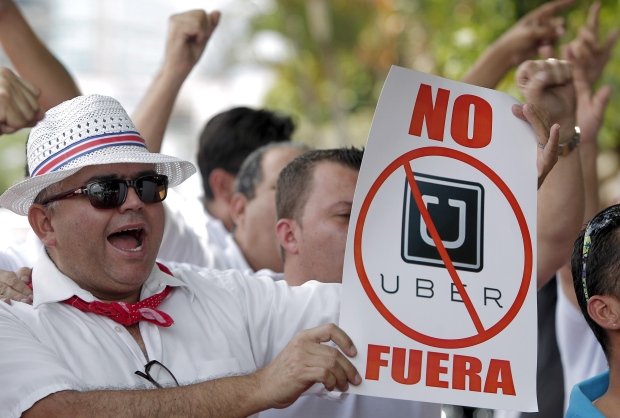Uber, Migrant Labor and the Commonality it Represents
Our problems are not unique and the cause of them can be easily identified.
One of the countries where I currently have business relationships is Costa Rica. It’s a beautiful country with plenty of beautiful people and based on what I have learned from my travels there, they essentially want the same things out of life that any other person in the world would want: personal and economic security and the ability to pursue their life-long desires. Unfortunately, like the rest of the world, this security and these desires are often stifled by the very people charged with offering such security and facilitating a proper environment for individuals to achieve those desires.
On my last trip to Costa Rica, there were a couple of issues being debated and contested both in the streets and in the halls of the country’s bureaucracy. The two main issues were Uber and migrant labor. (Sounds familiar, doesn’t it? No matter how much governments and societies pretend to be different from one another, they’re all pretty much the same.)
Much like the taxi drivers in our bloated metropolises here in the United States, taxi drivers in Costa Rica’s main cities of San Jose and Limon were throwing tantrums – even assaulting Uber drivers and vandalizing their vehicles. They felt, like the beloved taxi drivers in places like New York or Los Angeles do, that Uber drivers were unfairly undercutting their established taxi services because these Uber drivers were not seeking government permissions and paying the associated fees in order to give people rides in their personal vehicles. “It’s an unfair advantage,” they claimed. The common complaint and proposed solution was that, “They should have to comply with the same laws we have to comply with.”
Rather than embrace the idea that two people were perfectly capable of agreeing to terms without the heavy hand of government imposing unnecessary restrictions and then exacting fees for them, the taxi drivers begged for more intervention by the government to force the same absurd restrictions and costs on the new Uber drivers. Instead of seeing an opportunity to change their ways, reduce the burden of regulations and associated costs, and possibly earn much more money than they previously could, these taxi drivers fought to remain in their proverbial shackles. They chose an increasingly antiquated system that restricts their own individual liberty over an innovative step into the future of transportation that would help maximize that liberty.
When an opportunity for less restrictive work and increased customer satisfaction presented itself, it was rejected – at times, violently. And what happened with the supporters of Uber? Well, many of them responded in kind and attacked the taxi drivers and their vehicles. What does this tell us about the nature of government regulation and licensing and the general atmosphere that its barriers to entry create in various markets? And how will this not result in more conflict as peer-to-peer transactions and services increase and continue to circumvent the established, coercive state licensing rackets?
The problem, as in pretty much every other case, is government control and regulation of private property, not with those who are willing to meet demand by offering demanded services – often at a better price and higher quality. If taxi drivers actually understood this, they would be protesting the state that claims authority over them and their property, not their neighbors who want that authority eliminated.
In the same regard, the issue of migrant labor was being discussed among the political class.
Costa Rica produces over 80 million kilos of coffee per year. Many of the coffee farms are smaller plots of land owned by families. Much of the landscape makes it impossible to harvest with machinery, so the coffee must be hand-picked throughout the harvest season, which can run a few months in each region. Around the country in general, the annual harvest runs from around September through February or even March, depending on altitude. It’s no easy task considering that much of the labor force has migrated to the bigger cities in recent decades. There simply aren’t enough farmers to operate the farms and harvest all of the coffee themselves, so they depend on outside labor to assist each year.
“This is unacceptable,” say the bureaucrats in San Jose. Their benevolence as rulers has led them to believe that these workers should either not be hired or they should be paid a mandated minimum wage for their labor. Never mind the fact that these laborers have been migrating for decades, even well over a century, to perform these tasks, receive compensation, then return home until the following harvest season begins. So, what’s the reasoning for stopping this?
The bureaucrat will tell you that the laborer is being treated unfairly. They claim that the work being performed is deserving of much higher pay. It’s a noble argument if it weren’t for the fact that the higher pay simply isn’t possible at current global market prices for coffee. Sure, farmers could pay the workers more money, but could they demand higher prices for their coffee to compensate for the additional costs? It’s not as though the coffee farmers are the rich elite…unlike the bureaucrat who lives at the farmers’ expense. The average coffee farmer receives less than $10,000 of income per year for their multi-acre harvest.
Furthermore, if the laborers did not find it in their best interest to work the coffee farms every year, they wouldn’t do it. Regardless of whether or not these migrant workers are being paid what some bureaucrat would call a “fair” wage, the workers continue to migrate and continue to perform the job being asked of them. One would have to imagine that the migration and the work is somehow benefiting them, otherwise, why would they do it year after year? The demands of the farmers are being met and the compensation to the workers is not being refused by them.
Even in the streets of the capital, San Jose, plenty of individuals do not work or cannot find a steady job. The bureaucrats again claim that this is not “fair,” that “something must be done” to help them, and that the migrant workers are “taking jobs away” from the native population. Despite the availability of the seasonal employment in the coffee fields, many of these poor victims of “capitalist greed” choose to stay put and live in squalor in their urban slums. Can the migrant laborers and the coffee farmers really be blamed for the conditions of the inner-cities and the plight of Costa Rican citizens living there when work is available but rejected?
Does this not also sound familiar?
Should living and working conditions be better and should everyone be rich and happy? Of course. But in the real world, it just doesn’t happen, especially without effort. However, today’s conditions exist not only due to a general lack of effort by some, but mostly because of the distortion and destruction of markets via government interventions. And these interventions continue to be begged for and applauded by those who don’t bother learning about the very people they’re trying to help or realizing that the “help” being demanded and implemented usually results in harming the economy overall – particularly the ones who genuinely needed the help in the first place.
We can observe these exact scenarios play out in practically every country around the world today, including the grand ol’ United States. There is actually very little that separates our society here and the societies abroad, which the government often implies we ought to fear. The truth is, we’re the same and we’re all being hindered and aggravated by the same conflict-generating and economically-stifling entities. The only discernible difference is the amount of hindrance, aggravation, and conflict at any given point in time.
I am no better or no different than the average person in Costa Rica. My friends and partners there share many of the same goals as I do. That is the reason why I’m going to work with them and others to help each of us achieve our goals as individuals and as business partners. When we can avoid the intrusive state, we will. If we can find a way to completely circumvent it or to even work to abolish it altogether, we will likely do that as well. And I’ll do everything that I can to help anyone else do the same.
“It has to start somewhere.
It has to start sometime.
What better place than here?
What better time than now?” – Zack de la Rocha, Rage Against the Machine


Very nice article David.
The reluctance of cab-hustlers to emancipate and make a decent living is mind-boggling, to put it mildly. thankfully, even Uber suffers from a model of regulated centralization, and as we speak, new block-chain based alternatives are being polished up and combined with other logistical functions a la Lyft etc. As always, progress comes from technical innovation, not regulation and prohibition.
I've never understood why people would actually prefer to pay for licensing and to be regulated. If there were not laws about driving people around in your car, some people would actually be asking for them. That's the sad truth.
I'll continue hoping that individuals will wake from their comas and fix their stupidity. I'm not too confident about it, but hopeful.